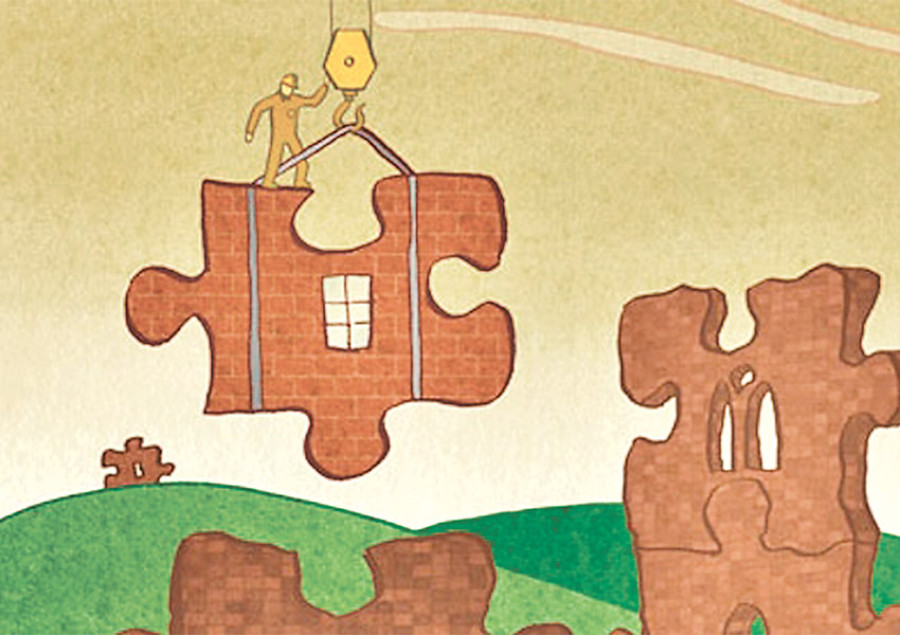Opinion
Tragedy and farce
Nepal’s slow reconstruction process is an indication of its failure to learn from history
Bhojraj Poudel
Right after the massive earthquake hit Nepal on April 25, like all Nepalis within and outside the country, I was flooded with questions about the safety of my family by my friends and acquaintances. One question, which could be labeled insensitive and naive, was if large earthquakes were frequent in Nepal. I explained that such a huge quake beyond seven magnitude had occurred after 81 years. The other question was: so, why was there no preparation at all if the Nepali people knew that they could face such a massive natural disaster? This time, I did not have a reply.
Here and there
Despite knowing that Nepal is prone to earthquakes, we never paid attention to preparing for the next big one, ie, we effectively did nothing for 81 years. Compare this with China—Nepal-China diplomatic relations recently completed 60 years—which has made big strides in all areas. Speaking at the US-China Strategic and Economic Dialogue-2014 in Beijing, one of the participants, a Chinese professor, said, “We (Chinese people) do not know where the future lies but what we know is, what China achieved in the last 30 years is unprecedented.” China literally started from scratch and currently its economy is larger than the US’. It is one of the world powers.
Sixty years down the line, Nepal is still among the least developed countries in the world as there has been no significant change in the livelihoods of its people. Most Nepalis still rely on traditional agriculture, and remittance has become the lifeline of the economy in recent years. More than 50 percent the Nepali population still live under the poverty line according to multidimensional poverty index. So, who is responsible for this situation? Most might accuse the corrupt and irresponsible political leaders for the mess but the reason for our backwardness is not just limited to them. Rather, it is because of the prominent features of our society such as irresponsibility, inefficiency and corruption at all levels of the state.
Going slow
In last 60 years, Nepal went through tremendous political changes—it overthrew the 104-year long Rana regime, established an elected government through the people’s movement, faced 30 years of Panchayat system and a decade long civil war which eventually overthrew a 240-year-old monarchy. These political upheavals, however, did not help Nepal prosper because the gains of these movements were not institutionalised.
Now, even after three months of the quake, there has been little progress with regards to the reconstruction process. The aid money that the bilateral and multilateral development partners have pledged for Nepal’s reconstruction can be spent only if the government can design and develop projects. What we need is an institution that can come up with ideas for projects and eventually implement them. Unfortunately, the much-touted Reconstruction Authority is yet to come into operation. While the government has recently appointed the current vice-chairperson of the National Planning Commission as the Chief Executive Officer of the Reconstruction Authority, things are moving ahead at snail’s pace. This has not only frustrated the Nepali people but also those who want to help Nepal.
Against this backdrop, the Asian Development Bank recently warned Nepal that the country could lose international aid if it fails to improve its portfolio performance in the coming days. This is enough proof that Nepal’s development process has been constantly disrupted due to low standards of procurement practices, inefficient bureaucracy and political wrangling. The recovery process after the quake has been notoriously slow as government agencies continue to be entangled in issues that have nothing to do with improving the quality of life of the people. They have not even been able to properly dispose debris in the Capital, let alone rural places, where the state is almost absent.
The only thing that has gained momentum after the earthquake is the constitution-writing process. All major political parties have been convinced that any more delay in the promulgation of the new constitution will not be in favour of any of them. However, this process has drawn huge criticism and even political leaders of the major parties have voiced their opposition against the proposed draft.
Not so hopeful
Meanwhile, the international community has promised to help Nepal rebuild itself but it will all depend on how much Nepal can do in terms of developing and implementing projects. So far, most of the development projects in Nepal have been a byproduct of political games. Hopefully, it will not happen in the coming days.
So, perhaps, it would not be wrong to conclude that Nepali society has persistently failed to learn from history. The country remained unprepared for a quake even though everyone knew it was coming. And Nepal’s leadership is yet to realise that the country is lagging behind many other nations that have managed to rebuild themselves despite facing devastating wars and natural calamities.
Poudel is a Kathmandu-based consultant and researcher at ThinkIN China (@Bhojup)




 25.92°C Kathmandu
25.92°C Kathmandu










